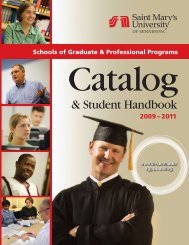PDF version - Saint Mary's University of Minnesota
PDF version - Saint Mary's University of Minnesota
PDF version - Saint Mary's University of Minnesota
Create successful ePaper yourself
Turn your PDF publications into a flip-book with our unique Google optimized e-Paper software.
History<br />
H333 The Reformation 3 credits<br />
In traditional terms the Reformation refers to the sixteenth-century religious movement that culminated<br />
in both the reforms <strong>of</strong> the Church and its division. The course balances a study <strong>of</strong> the theological issues<br />
that defined the magisterial Protestant Reformation and its Catholic counterpart with an exploration <strong>of</strong><br />
popular religion and the everyday religious experience <strong>of</strong> sixteenth-century men and women.<br />
H335 American Environmental History 3 credits<br />
The course introduces students to environmental history as an academic discipline and teaches<br />
American history through the lens <strong>of</strong> that discipline. It emphasizes the reciprocal and symbiotic<br />
relationship between human beings that historically have occupied North America and their<br />
surroundings - the natural environment as these human beings encountered and transformed them. As<br />
such, the course introduces students to the various strands in environmental thought, environmental<br />
science, environmental practices, religious belief as it pertains to the relationship between human<br />
beings and the environment, and environmental politics that have shaped the history <strong>of</strong> North America<br />
and the United States. The course also familiarizes students with the practices <strong>of</strong> historiography and the<br />
specific historiography <strong>of</strong> environmental history.<br />
H340-349 Selected Topics 3 credits<br />
Selected topics in history may be <strong>of</strong>fered depending on student and faculty interest.<br />
H355 U.S. Women’s History 3 credits<br />
This course is an examination <strong>of</strong> the image, roles, status, and activities <strong>of</strong> American women. In addition,<br />
gender issues are explored within their socio-political, cultural, and historical contexts. Special emphasis<br />
is be placed on a comparative approach to the study <strong>of</strong> women’s lives as they interact with race, class,<br />
and ethnicity.<br />
H357 The History <strong>of</strong> Rock and Roll 3 credits<br />
This course analyzes the rise, development, and socio-cultural impact <strong>of</strong> rock and roll, broadly defined<br />
to include soul, rhythm and blues, punk, reggae, country, hip hop, heavy metal, and other genres that<br />
have become essential parts <strong>of</strong> American popular culture. Through critical analysis <strong>of</strong> the texts, images,<br />
sounds, business practices, and media machinery <strong>of</strong> rock culture, as well as <strong>of</strong> rock and roll’s pr<strong>of</strong>ound<br />
impact on television, fashion, race relations, gender relations, advertising, and politics students gain an<br />
understanding <strong>of</strong> the functions <strong>of</strong> popular art and culture in the political, social, and economic life <strong>of</strong><br />
the United States. The course challenges students to critically examine primary source materials and<br />
secondary readings about topic such as the southern roots <strong>of</strong> rock music, postwar youth culture, race<br />
and racism, class, gender and sexuality, technology and mass media, the culture wars, and rock music as<br />
an American export, and thereby come to a greater understanding <strong>of</strong> the development and interaction<br />
<strong>of</strong> modern and postmodern culture.<br />
H365 Early Modern Europe 3 credits<br />
The early modern period is one <strong>of</strong> the most tumultuous in Western history. Religious division, state<br />
building, war, and intellectual revolution are some distinctive features. Students have an opportunity<br />
to investigate selected topics and historical methods including the development <strong>of</strong> absolutism, the<br />
Scientific Revolution, popular culture, and the Enlightenment. Topics may be added or deleted from<br />
time to time.<br />
H366 Modern Europe 1789-1914 3 credits<br />
This course is an introduction to the history <strong>of</strong> Europe during its explosive period <strong>of</strong> modernization,<br />
beginning with two concurrent world-changing events — the French Revolution and the Industrial<br />
Revolution. Using a variety <strong>of</strong> sources, including works by historians but also primary sources ranging<br />
from manifestos and letters to plays and novels, students investigate the ideas and movements which<br />
emerged from this “dual revolution” to change the world, including imperialism, liberalism, socialism,<br />
feminism, and nationalism.<br />
115<br />
115
















